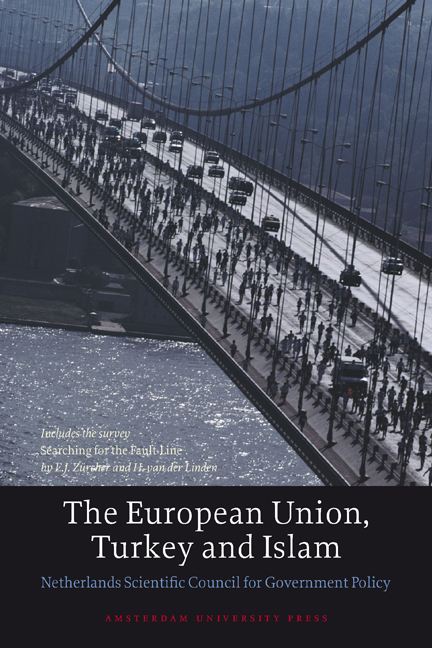Book contents
- Frontmatter
- Contents
- Summary
- Preface
- 1 Introduction
- 2 The European Union and Religion
- 3 Turkish Islam and the European Union
- 4 Conclusions
- Epilogue
- Literature
- Searching for the Fault-Line
- 5 Introduction: Turkey – Fault-Line, Frontline or Test Case?
- 6 Turkey’S Current Islamic Landscape
- 7 Turkish Islam and the Eu: a Clash of Civilisations?
- 8 Conclusion: Turkish Islam and European Civilisation
- Literature
- Websites
5 - Introduction: Turkey – Fault-Line, Frontline or Test Case?
Published online by Cambridge University Press: 14 January 2021
- Frontmatter
- Contents
- Summary
- Preface
- 1 Introduction
- 2 The European Union and Religion
- 3 Turkish Islam and the European Union
- 4 Conclusions
- Epilogue
- Literature
- Searching for the Fault-Line
- 5 Introduction: Turkey – Fault-Line, Frontline or Test Case?
- 6 Turkey’S Current Islamic Landscape
- 7 Turkish Islam and the Eu: a Clash of Civilisations?
- 8 Conclusion: Turkish Islam and European Civilisation
- Literature
- Websites
Summary
Since the mid-1990s, the discussion on Turkey's potential accession to the European Union (EU) has not merely been conducted on the basis of criteria determining the state of democracy and human rights, security and the economy. The EU's dramatic eastward expansion has also prompted European writers and politicians in particular to reflect more generally on ‘Europe’s’ fundamental characteristics and borders. It almost goes without saying that these discussions have become focused on the case of Turkey. After all, this is not merely the only country officially enjoying the prospect of full membership of the EEC/EC/EU for over forty years, but also the country that is perceived as being culturally least like the other member states.
In debates, the divergent cultural character of Turkey is generally linked to the fact that over 95 per cent of its population say that they are Muslims. Historically, a contributing factor to that perception is surely that for hundreds of years, Turkey, or rather, the Ottoman Empire, was the only Islamic superpower directly confronting Europe.
Those who voice objections to Turkey's inclusion into the EU on cultural or religious grounds, often base their arguments either explicitly or implicitly on American sociologist Samuel Huntington's theories on the socalled ‘clash of civilisations’. Huntington first aired his ideas on the ‘clash of civilisations’ in the American journal, Foreign Affairs in 1993. What he said in his article, and what he further developed in 1996 in a book, is summarised below.
Since the birth of the system of international relations in the 16th and 17th centuries, roughly four phases can be distinguished in history. The first phase lasted until the French Revolution. International relations during this time were essentially conducted among sovereigns. The French Revolution changed this into a system of relations among nations. During both these phases, the international system was multipolar. In other words, there were many more or less equal players who together determined the course of war and peace. After the First World War, this system founded on nation-states came to an end.
- Type
- Chapter
- Information
- The European Union, Turkey and Islam , pp. 87 - 92Publisher: Amsterdam University PressPrint publication year: 2004



